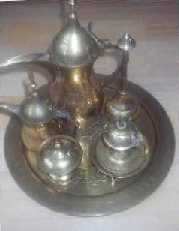
The Waswahili Community Trust UK
(Wadhamini wa Jumuiya ya Waswahili)


|
The Waswahili Community Trust UK |

|
One impact that Islam had on the Swahilis was to bring them into a widening net of an international brotherhood. The shores of the Indian Ocean became increasingly a zone of a proliferating Pan-Islamic fraternity.
There was Somalia, the whole Arabian Peninsula, the Gulf Area, Kuwait, Iraq, India, Sri Lanka, Bengal, Malaysia and Indonesia. This entire swathe of the Indian Ocean had become Islamized.
With that came not only a common Book but a common way of life and government which brought the Swahilis into an international multi-faceted frame of reference. In the context of the time, it might even be legitimate to talk of a microcosm of the then known civilized world.
Within this frame of reference is the licence given to all Muslim men to marry more than one wife - up to four in fact - at any one time. This would have had a tremendous effect on legitimising inter-marriage between this large pool of Muslims occupying the Indian Ocean and who have traditionally been trading with one another for several millennia.
While the gene distribution by roaming sailors before the advent of Islam was largely an illicit sexual behaviour, Islam legitimised and controlled the sexual behaviour of not only sailors but also respectable traders. This meant that traders could have an open and legitimate marriage.
This in turn meant that the children of such marriages were not the unfortunate outcome of either rape or prostitution. They were children of acknowledged and legitimate parents in the sight of Man and God.
Conditions in Swahililand were seemingly favourable for receiving traders. We know little about the intermarriage between Swahili traders with other inhabitants of the Indian Ocean. It is possible that African Swahili beauties were particularly attractive to foreign traders.
But pre-Islamic Swahilis were probably of a much less rich blend of genes that those of post-Islamic Swahilis. Hinterland African tribes did not enjoy the hybrid vigour of the kind of inter-marriage that the Swahilis were privileged to have. This in turn meant that the kind of genetic purity or homogeneity that was true of other hinterland tribes had long been lost by the Swahilis.
Which brings us back to the question of genetic definition of the Swahilis. Because the Swahilis were historically the front line of Indian Ocean hospitality, the constant inter-breeding with other visiting communities of the Indian Ocean resulted in an enhanced rich mixture of genes.
We appeal for your donation for our charity
Comments and suggestions to improve this website
Your suggestions or concerns about our services
Please send you contributions using the form to contact us.
| Thank you Asanteni |
|---|

Copyright© March 2003: The Waswahili Comunity Trust (UK)
Registered Charity:1083065